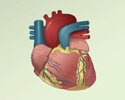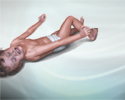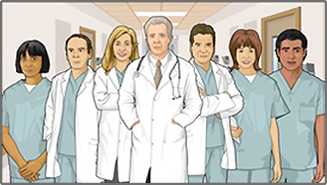Chronic kidney disease
Chronic kidney disease is the slow loss of kidney function over time. The main job of the kidneys is to remove wastes and excess water from the body.
Causes
Chronic kidney disease (CKD) slowly gets worse over months or years. You may not notice any symptoms for some time. The loss of function may be so slow that you do not have symptoms until your kidneys have almost stopped working.
The final stage of CKD is called end-stage renal disease (ESRD). At this stage, the kidneys are no longer able to remove enough wastes and excess fluids from the body. At this point, you would need dialysis or a kidney transplant.
End-stage renal disease
End-stage kidney disease (ESKD) is the last stage of long-term (chronic) kidney disease. This is when your kidneys can no longer support your body's...

Kidney transplant
A kidney transplant is surgery to place a healthy kidney into a person with kidney failure.

Diabetes and high blood pressure are the 2 most common causes and account for most cases.
Diabetes
Diabetes is a long-term (chronic) disease in which the body cannot regulate the amount of sugar in the blood.

High blood pressure
Blood pressure is a measurement of the force exerted against the walls of your arteries as your heart pumps blood to your body. Hypertension is the ...

Many other diseases and conditions can damage the kidneys, including:
- Autoimmune disorders (such as systemic lupus erythematosus and scleroderma)
- Birth defects of the kidneys (such as polycystic kidney disease)
- Some toxic chemicals
- Injury to the kidney
- Kidney stones and infection
Kidney stones
A kidney stone is a solid mass made up of tiny crystals. One or more stones can be in the kidney or ureter at the same time.
 ImageRead Article Now Book Mark Article
ImageRead Article Now Book Mark Article - Problems with the arteries feeding the kidneys
- Some medicines, such as antibiotics, and pain and cancer medicines
- Backward flow of urine into the kidneys (reflux nephropathy)
CKD leads to a buildup of fluid and waste products in the body. This condition affects most body systems and functions, including:
- High blood pressure
- Low blood cell count
- Vitamin D and bone health
Symptoms
The early symptoms of CKD are the same as for many other illnesses. These symptoms may be the only sign of a problem in the early stages.
Symptoms may include:
- Appetite loss
- General ill feeling and fatigue
General ill feeling
Malaise is a general feeling of discomfort, illness, or lack of well-being.
 ImageRead Article Now Book Mark Article
ImageRead Article Now Book Mark ArticleFatigue
Fatigue is a feeling of weariness, tiredness, or lack of energy.
 ImageRead Article Now Book Mark Article
ImageRead Article Now Book Mark Article - Headaches
Headaches
A headache is pain or discomfort in the head, scalp, or neck. Serious causes of headaches are rare. Most people with headaches can feel much better...
 ImageRead Article Now Book Mark Article
ImageRead Article Now Book Mark Article - Itching (pruritus) and dry skin
- Nausea
Nausea
Nausea is feeling an urge to vomit. It is often called "being sick to your stomach. "Vomiting or throwing-up forces the contents of the stomach up t...
 ImageRead Article Now Book Mark Article
ImageRead Article Now Book Mark Article - Weight loss without trying to lose weight
Weight loss
Unexplained weight loss is a decrease in body weight, when you did not try to lose the weight on your own. Many people gain and lose weight. Uninten...
Read Article Now Book Mark Article
Symptoms that may occur when kidney function has gotten worse include:
- Abnormally dark or light skin
- Bone pain
- Drowsiness or problems concentrating or thinking
- Numbness in the hands and feet
Numbness
Numbness and tingling are abnormal sensations that can occur anywhere in your body, but they are often felt in your fingers, hands, feet, arms, or le...
 ImageRead Article Now Book Mark Article
ImageRead Article Now Book Mark Article - Muscle twitching or cramps
- Breath odor
Breath odor
Breath odor is the scent of the air you breathe out of your mouth. Unpleasant breath odor is commonly called bad breath.
 ImageRead Article Now Book Mark Article
ImageRead Article Now Book Mark Article - Easy bruising, or blood in the stool
- Excessive thirst
Excessive thirst
Excessive thirst is an abnormal feeling of always needing to drink fluids.
 ImageRead Article Now Book Mark Article
ImageRead Article Now Book Mark Article - Frequent hiccups
- Problems with sexual function
- Menstrual periods stop (amenorrhea)
- Shortness of breath
- Sleep problems
- Swelling in the hands and feet
- Vomiting
Vomiting
Nausea is feeling an urge to vomit. It is often called "being sick to your stomach. "Vomiting or throwing-up forces the contents of the stomach up t...
 ImageRead Article Now Book Mark Article
ImageRead Article Now Book Mark Article
Exams and Tests
Most people will have high blood pressure at all stages of CKD. During an exam, your health care provider may also hear abnormal heart or lung sounds in your chest. You may have signs of nerve damage during a nervous system exam.
A urinalysis may show protein or other changes in your urine. These changes may appear months to years before symptoms appear.
Urinalysis
Urinalysis is the physical, chemical, and microscopic examination of urine. It involves a number of tests to detect and measure various compounds th...

Tests that check how well the kidneys are working include:
- Creatinine clearance
- Creatinine levels
- Blood urea nitrogen (BUN)
CKD changes the results of several other tests. You may need to have the following blood tests as often as every 2 to 3 months when kidney disease gets worse:
- Albumin
- Calcium
- Cholesterol
Cholesterol
Cholesterol is a soft, wax-like substance found in all parts of the body. Your body needs cholesterol to work properly. But too much cholesterol ca...
 ImageRead Article Now Book Mark Article
ImageRead Article Now Book Mark Article - Complete blood count (CBC)
Complete blood count
A complete blood count (CBC) test measures the following:The number of white blood cells (WBC count)The number of red blood cells (RBC count)The numb...
 ImageRead Article Now Book Mark Article
ImageRead Article Now Book Mark Article - Electrolytes
- Magnesium
- Phosphorous
- Potassium
- Sodium
Other tests that may be done to look for the cause or type of kidney disease include:
- CT scan of the abdomen
CT scan of the abdomen
An abdominal CT scan is an imaging test that uses x-rays to create cross-sectional pictures of the belly area. CT stands for computed tomography....
 ImageRead Article Now Book Mark Article
ImageRead Article Now Book Mark Article - MRI of the abdomen
- Ultrasound of the abdomen
Ultrasound of the abdomen
Abdominal ultrasound is a type of imaging test. It is used to look at organs in the abdomen, including the liver, gallbladder, pancreas, and kidneys...
 ImageRead Article Now Book Mark Article
ImageRead Article Now Book Mark Article - Kidney biopsy
Kidney biopsy
A kidney biopsy is the removal of a small piece of kidney tissue for examination.
 ImageRead Article Now Book Mark Article
ImageRead Article Now Book Mark Article - Kidney scan
Kidney scan
A renal scan is a nuclear medicine exam in which a small amount of radioactive material (radioisotope) is used to measure the function of the kidneys...
 ImageRead Article Now Book Mark Article
ImageRead Article Now Book Mark Article - Kidney ultrasound
- Urine protein
This disease may also change the results of the following tests:
- Erythropoietin
- Parathyroid hormone (PTH)
PTH
The PTH test measures the level of parathyroid hormone in the blood. PTH stands for parathyroid hormone. It is a protein hormone released by the par...
Read Article Now Book Mark Article - Bone density test
Bone density test
A bone mineral density (BMD) test measures how much calcium and other types of minerals are in an area of your bone. This test helps your health care...
 ImageRead Article Now Book Mark Article
ImageRead Article Now Book Mark Article - Vitamin D level
Vitamin D
Vitamin D is a fat-soluble vitamin. Fat-soluble vitamins are stored in the body's fatty tissue and liver.
 ImageRead Article Now Book Mark Article
ImageRead Article Now Book Mark Article
Treatment
Blood pressure control will slow further kidney damage.
- Angiotensin-converting enzyme (ACE) inhibitors or angiotensin receptor blockers (ARBs) are used most often.
- The goal is to keep blood pressure at or below 130/80 mm Hg.
Making lifestyle changes can help protect the kidneys, and prevent heart disease and stroke, such as:
Heart disease
Coronary heart disease is a narrowing of the blood vessels that supply blood and oxygen to the heart. Coronary heart disease (CHD) is also called co...

Stroke
A stroke occurs when blood flow to a part of the brain stops. A stroke is sometimes called a "brain attack. " If blood flow is cut off for longer th...

- DO NOT smoke.
- Eat meals that are low in fat and cholesterol.
- Get regular exercise (talk to your provider or nurse before starting to exercise).
- Take medicines to lower your cholesterol, if needed.
- Keep your blood sugar under control.
- Avoid eating too much salt or potassium.
Always talk to your provider before taking any over-the-counter medicine. This includes vitamins, herbs and supplements. Make sure all of the providers you visit know you have CKD. Other treatments may include:
Vitamins
Vitamins are a group of substances that are needed for normal cell function, growth, and development. There are 13 essential vitamins. This means th...

- Medicines called phosphate binders, to help prevent high phosphorous levels
- Extra iron in the diet, iron pills, iron given through a vein (intravenous iron) special shots of a medicine called erythropoietin, and blood transfusions to treat anemia
Anemia
Anemia is a condition in which the body does not have enough healthy red blood cells. Red blood cells provide oxygen to body tissues. Different type...
 ImageRead Article Now Book Mark Article
ImageRead Article Now Book Mark Article - Extra calcium and vitamin D (always talk to your provider before taking)
Your provider may have you follow a special diet for CKD.
- Limiting fluids
- Eating less protein
- Restricting phosphorous and other electrolytes
- Getting enough calories to prevent weight loss
All people with CKD should be up-to-date on the following vaccinations:
- Hepatitis A vaccine
Hepatitis A vaccine
All content below is taken in its entirety from the CDC Hepatitis A Vaccine Information Statement (VIS): www. cdc. gov/vaccines/hcp/current-vis/hepat...
 ImageRead Article Now Book Mark Article
ImageRead Article Now Book Mark Article - Hepatitis B vaccine
Hepatitis B vaccine
All content below is taken in its entirety from the CDC Hepatitis B Vaccine Information Statement (VIS): www. cdc. gov/vaccines/hcp/current-vis/hepat...
 ImageRead Article Now Book Mark Article
ImageRead Article Now Book Mark Article - Flu vaccine
Flu vaccine
All content below is taken in its entirety from the CDC Inactivated Influenza Vaccine Information Statement (VIS) www. cdc. gov/vaccines/hcp/current-...
 ImageRead Article Now Book Mark Article
ImageRead Article Now Book Mark Article - Pneumococcal vaccine (also called "pneumonia vaccine")
Pneumococcal vaccine
All content below is taken in its entirety from the CDC Pneumococcal Polysaccharide Vaccine Information Statement (VIS): CDC review information for P...
 ImageRead Article Now Book Mark Article
ImageRead Article Now Book Mark Article - COVID-19
Support Groups
More information and support for people with CKD and their families can be found at a kidney disease support group.
Outlook (Prognosis)
Many people are not diagnosed with CKD until they have lost most of their kidney function.
There is no cure for CKD. Whether it worsens to ESRD, and how quickly, depends on:
ESRD
End-stage kidney disease (ESKD) is the last stage of long-term (chronic) kidney disease. This is when your kidneys can no longer support your body's...

- The cause of kidney damage
- How well you take care of yourself
Kidney failure is the last stage of CKD. This is when your kidneys can no longer support our body's needs.
Your provider will discuss dialysis with you before you need it. Dialysis removes waste from your blood when your kidneys can no longer do their job.
Dialysis
Dialysis treats end-stage kidney failure. It removes harmful substances from the blood when the kidneys cannot. This article focuses on peritoneal d...

In most cases, you will go to dialysis when you have only 10 to 15% of your kidney function left.
Even people who are waiting for a kidney transplant may need dialysis while waiting.
Possible Complications
Complications may include:
- Anemia
Anemia
Anemia is a condition in which the body does not have enough healthy red blood cells. Red blood cells provide oxygen to body tissues. Different type...
 ImageRead Article Now Book Mark Article
ImageRead Article Now Book Mark Article - Bleeding from the stomach or intestines
- Bone, joint, and muscle pain
- Changes in blood sugar
- Damage to nerves of the legs and arms (peripheral neuropathy)
Peripheral neuropathy
Peripheral nerves carry information to and from the brain. They also carry signals in both directions between the spinal cord and the rest of the bo...
 ImageRead Article Now Book Mark Article
ImageRead Article Now Book Mark Article - Dementia
Dementia
Dementia is a loss of brain function that occurs with certain diseases. It affects one or more brain functions such as memory, thinking, language, j...
 ImageRead Article Now Book Mark Article
ImageRead Article Now Book Mark Article - Fluid buildup around the lungs (pleural effusion)
Pleural effusion
A pleural effusion is a buildup of fluid between the layers of tissue that line the lungs and chest cavity.
 ImageRead Article Now Book Mark Article
ImageRead Article Now Book Mark Article - Heart and blood vessel complications
- High blood phosphorous levels
- High blood potassium levels
- Hyperparathyroidism
Hyperparathyroidism
Hyperparathyroidism is a condition in which 1 or more of the parathyroid glands in your neck produce too much parathyroid hormone (PTH).
 ImageRead Article Now Book Mark Article
ImageRead Article Now Book Mark Article - Increased risk of infections
- Liver damage or failure
- Malnutrition
- Miscarriages and infertility
- Seizures
Seizures
A seizure is the physical changes in behavior that occurs during an episode of specific types of abnormal electrical activity in the brain. The term ...
 ImageRead Article Now Book Mark Article
ImageRead Article Now Book Mark Article - Swelling (edema)
Edema
Swelling is the enlargement of organs, skin, or other body parts. It is caused by a buildup of fluid in the tissues. The extra fluid can lead to a ...
 ImageRead Article Now Book Mark Article
ImageRead Article Now Book Mark Article - Weakening of the bones and increased risk of fractures
Prevention
Treating the condition that is causing the problem may help prevent or delay CKD. People who have diabetes should control their blood sugar and blood pressure levels and should not smoke.
Reviewed By
Walead Latif, MD, Nephrologist and Clinical Associate Professor, Rutgers Medical School, Newark, NJ. Review provided by VeriMed Healthcare Network. Also reviewed by David C. Dugdale, MD, Medical Director, Brenda Conaway, Editorial Director, and the A.D.A.M. Editorial team.
Christov M, Sprague SM. Chronic kidney disease - mineral bone disorder. In: Yu ASL, Chertow GM, Luyckx VA, Marsden PA, Skorecki K, Taal MW, eds. Brenner and Rector's The Kidney. 11th ed. Philadelphia, PA: Elsevier; 2020:chap 53.
Grams ME, McDonald SP. Epidemiology of chronic kidney disease and dialysis. In: Johnson RJ, Floege J, Tonelli M, eds. Comprehensive Clinical Nephrology. 7th ed. Philadelphia, PA: Elsevier; 2024:chap 80.
Levey AS, Sarnak MJ. Chronic kidney disease. In: Goldman L, Cooney KA, eds. Goldman-Cecil Medicine. 27th ed. Philadelphia, PA: Elsevier; 2024:chap 116.
Taal MW. Classification and management of chronic kidney disease. In: Yu ASL, Chertow GM, Luyckx VA, Marsden PA, Skorecki K, Taal MW, eds. Brenner and Rector's The Kidney. 11th ed. Philadelphia, PA: Elsevier; 2020:chap 59.





